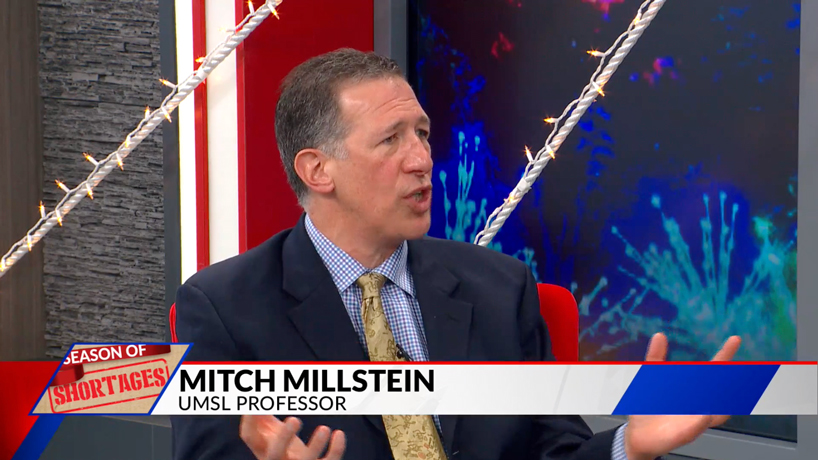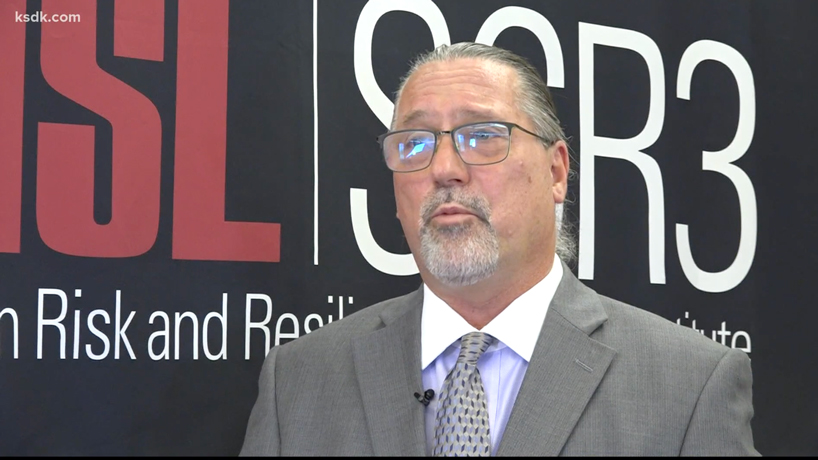
Mitch Millstein, a professional practice professor in the Department of Supply Chain and Analytics, appears as an in-studio guest on a half-hour special titled “Season of Shortages,” a joint production of KTVI (Channel 2) and KMOX Radio (1120 AM). (Screenshot)
The average person has become much more aware of supply chains over the past two years with the COVID-19 pandemic causing disruptions on the movement of goods around the globe.
Those disruptions have manifested themselves at different times in empty shelves at grocery and big box stores and in rising prices on all sorts of products – from ground beef to gasoline.
As Americans head into arguably the busiest shopping time of the year, news media in St. Louis and beyond have been calling on supply chain experts such as University of Missouri–St. Louis faculty members Mitch Millstein and George Zsidisin to provide insight on what shoppers should expect as they prepare for the holiday season.
Millstein, a professional practice professor in the College of Business Administration’s Department of Supply Chain and Analytics, appeared as an in-studio guest on Tuesday as KTVI (Channel 2) and KMOX Radio (1120 AM) teamed up for a half-hour special called “Season of Shortages,” which aimed to cover everything “from products and staff shortages to shopping and shipping stress,” according to a promotional video for the program.
Speaking with KTVI’s Mike Colombo and KMOX’s Carol Daniel, Millstein explained the source of the supply chain issues which, in some cases, can be traced back to the early days of the pandemic.
George Zsidisin, the John W. Barriger III Endowed Professor and director of UMSL’s Supply Chain Risk and Resilience Research Institute, spoke to KSDK (Channel 5) reporter Ryan Dean about the supply chain issues being felt right now. (Screenshot)
“What happened overseas is containers just ended up in the wrong place,” Millstein said. “This is really a once-in-a-lifetime phenomenon that because we stopped ordering them or we put a stop to the orders, they had to go someplace. They ended up in the wrong place. This is still being sorted out today.”
There are not easy solutions.
“It’s a really difficult situation,” he said. “I think the example that I can give is shown in a conversation I had with the president of a manufacturing firm right here in town – a midsize company, not a global giant. And they said their No. 1 problem is getting materials – getting materials from Europe, getting materials from Mexico, from Asia, from domestic suppliers. If he gets all the material that he needs, his No. 2 problem is the labor shortage. He has both –getting material, then labor – and those really come together.
“So, that’s what we’re seeing – a shortage of material, a shortage in labor. That material shortage is due to the labor shortage all over the world. This is not just the United States. We’re seeing this all over the world due to the pandemic.”
Zsidisin, John W. Barriger III Endowed Professor and the director of UMSL’s Supply Chain Risk and Resilience Research Institute, provided a similar assessment of the situation in an interview with reporter Ryan Dean that aired earlier this week on KSDK (Channel 5).
“Once you have that disruption that occurs within a flow, it takes a period of time to get everything back running again,” Zsidisin said. “It’s going to take a few more months before we get through all the bottlenecks.”
Zsidisin explained some of the inflationary pressure that’s created in the country and around the globe.
“When we’re used to having approximately $3,000 to $4,000 to pay per container to be shipped, and now we’re looking at spot rates of close to $20,000, that’s going to have a direct impact on the price of goods for consumers,” Zsidisin said.
Both Zsidisin and Millstein see reason for optimism over the horizon.
Millstein spoke to host Steve Bertrand of WGN Radio (720 AM) in Chicago earlier this month about comments from Federal Reserve Chairman Jerome Powell that supply bottlenecks and shortages and elevated inflation would persist well into next year.
“I’m going to be a contra-contrarian, Steve, and say that I think the bottlenecks are going to relieve faster than what he’s saying,” Millstein said. “I think everybody just wants to be so negative, that they’re pushing it into late next year or even further. ‘It’s going to go on forever.’ It’s not going to go on forever. We’re working on it.”
People could still have some stress finding gifts for the people on their shopping lists and figuring out how to ensure they get to their recipients in time for the holidays.
Media Coverage
KTVI (Channel 2)
KSDK (Channel 5)
WGN Radio (720 AM)















